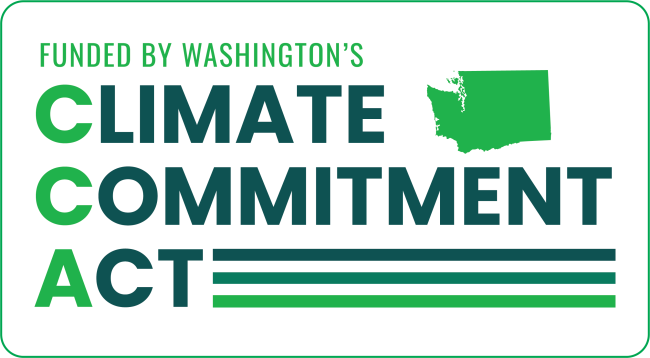Zero-emission Vehicle Infrastructure Partnerships grant
Learn about and apply for the Zero-Emission Vehicle Infrastructure Partnerships (ZEVIP) grant, which provides funding for the installation of new electric vehicle charging equipment and hydrogen fueling infrastructure along priority corridors.
GovDelivery distribution list
To stay informed on ZEV infrastructure grant programs, please register for updates by selecting the Funding and Zero-Emission Vehicle Grants subscription topics.
Notice of proposed awards
We are pleased to announce the ZEVIP Notice of Proposed Awards (PDF 862 KB) for the 2023-2025 biennium, representing an investment of $30,221,717 in new EV fast charging stations across Washington. Funding for this program was authorized in Engrossed Substitute House Bill 1125, Section 215 (1), and is provided by the Electric Vehicle Account and Carbon Emissions Reduction Account.
ZEVIP is supported with funding from Washington's Climate Commitment Act. The CCA supports Washington’s climate action efforts by putting cap-and-invest dollars to work reducing climate pollution, creating jobs, and improving public health. Information about the CCA is available at www.climate.wa.gov.

Priority corridors
Priority corridors for EV charging infrastructure include only state routes, that is, no Interstate or U.S. routes. For EV charging, stations should be located at least every 50 miles and within one travel mile of the priority corridor. Priority corridors for hydrogen fueling infrastructure include Interstates, U.S. routes, and state routes. Hydrogen stations should be located at least every 150 miles and within five travel miles of the priority corridor.
Eligible applicants
Nonprofit organizations, tribes, and state and local government agencies such as cities, towns, counties, and districts are eligible to apply. Potential grant recipients must partner with private-sector organizations to develop and implement their projects.
Eligible projects
Funding may be used for site design, equipment purchases, electrical upgrades, installation, signage, operations, and maintenance. Eligible projects are limited to:
New installations of EV charging infrastructure
For example, new direct-current, fast-charging stations with at least four combined charging system (CCS) ports, supporting at least 150 kW per port simultaneous charging.
New installations of hydrogen refueling infrastructure
For example, new open retail hydrogen refueling station with a minimum of two Society of Automotive Engineers (SAE) International J2601 H70-T40 light-duty fueling positions.
Completed grant projects
We awarded $9.3 million in grants for the 2021-2023 program. These investments modernized the 12 original west coast electric highway sites and built 12 new DCFC stations along 2 interstates, 2 us routes, and 9 state routes in 24 communities across the state.
We awarded $1 million in grants for the 2017-2019 program to install 15 new electric-vehicle charging stations along 4 interstates and 1 us route.
Slow down on ice and snow.
It's easier to skid or lose control traveling at higher speeds. Give yourself more time to stop.
Carry chains, practice installing them.
Winter conditions could mean chains are required on your route. Practice putting them on your vehicle ahead of time.
Pack your winter car kit.
Carry extra supplies like warm clothing, ice scraper and brush, jumper cables and other emergency items.
